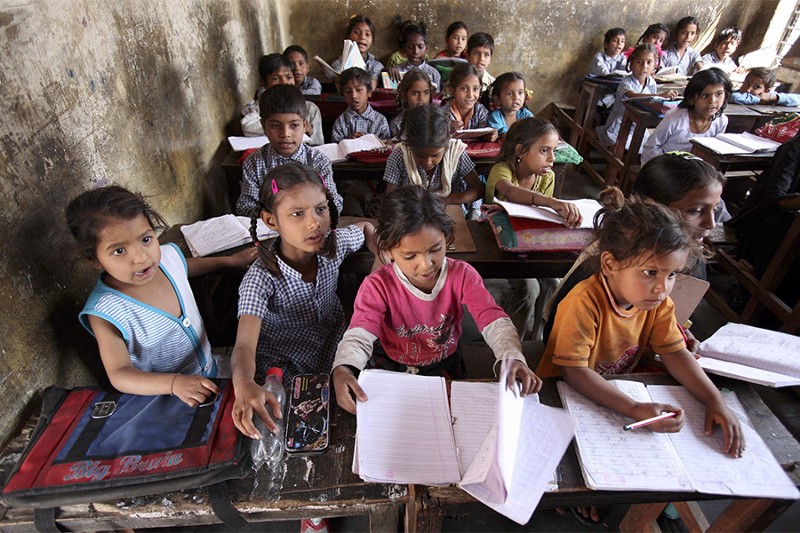Currently, the governmental roles of policy making, regulation and service delivery are combined within a single entity in the Indian Education Sector. There is a need, however, for these to be separated into 3 different entities with an “arms- length” relationship between them (similar to sectors such as finance, telecom and electricity). Doing so would free up valuable bandwidth for policy making and regulation which is currently being impeded by service delivery. In turn, this would enable an in- depth understanding of the issues faced by private sector entities, leading to the healthy development of the sector as a whole.
After many years of experience talking to stakeholders across the spectrum in Indian school education, I have realized that most education experts and government bureaucrats, while declaring the primacy of the Indian state in providing education services, are accepting that the private sector has a role to play and is here to stay (government data indicates that the private sector serves 11 crore children representing a 44% market share). In addition, government ministers and bureaucrats also express desire to have a private sector which provides high quality services at reasonable prices and are distressed that, currently, this is not the case.
On the other side, I have also come across many researchers, policy think tanks, and school associations from the private sector with tremendous ideas to help the government achieve the above vision. Some of these ideas include reforming recognition requirements and the non-profit rule to lower barriers to entry, having joint committees between government and school associations for on-going dialogue and quick resolution of issues, and PPP models where the private sector can take over various aspects of the running of a government schools to bring innovation and accountability in the system.
Despite the “demand” for ways to bring reforms in Indian school education, and the “supply” of great ideas for the same, it seems the “market” is not clearing. My own experience and the experience of others shows that it is extremely difficult, if not impossible, to get time to even be heard by government ministers and bureaucrats. Clearly, without any change in this, one cannot expect any concrete, considered reform. In fact, the only policy changes that happen seem to be “knee jerk” political responses such as the fee regulation bill in Gujarat that try to address the symptoms and not the root cause of problems. These kind of ill-considered changes often make the situation worse.
My submission is that the paramount reason for the above situation is the sheer lack of time among government ministers and bureaucrats as the service provision function (of running the huge government school apparatus) takes up 99% of management time and energy leaving almost nothing for policy making and regulation. As someone who runs a school, I know the amount of management bandwidth is takes to run one school. Everyday operational challenges and emergencies eat up huge amounts of time and energy. In a small state such as Haryana, the state government’s education department runs more than 14,000 schools! It is hardly surprising that running this huge apparatus leaves almost no time to think broadly about policy making and regulation for the private sector and the sector as a whole.
Another related reason for the step-motherly treatment of the private sector is that, given the entire education department is spending almost all its time and energy in running the government school system, their key success metric is the performance (in terms of pass percentage, number of government school students getting into IITs, etc) of the government schools. Comparison of their performance with private school students is inevitable and is even tom-tommed by the ministers in the media. Consequently, there is a sense of competition with the private sector which naturally shapes unduly negative perceptions about the private sector. These negative perceptions of the private sector inevitably come through in whatever policy making and regulation does occur. Think about how Airtel feels about Jio and what would happen if Jio were in charge of setting telecom policy!
An analogy to understand the current situation is to imagine if the finance ministry of the central government were also in-charge of day to day running of the PSU banks. And by the way, there is no RBI for regulatory oversight either! It is not difficult to realize that private sector banks and financial entities would be in much worse shape and the healthy development of the financial sector would be considerably hindered.
For a moment, let us set aside the impact of lack of time due to running government schools on private sector policy and regulation. I would imagine that this lack of time for policy making would also impact the government system — one would be too terribly lost in the trees to even understand whether one is in the right forest.
The answer to the above conundrum is technically simple — separate out the policy making, regulatory and service delivery functions of the government into different entities with an arms length relationship between the three. Similar to PSU banks, government schools should be housed in a separate “service delivery” entity or entities under the ownership of the government. Clearly, as education is a state subject, this would need to happen at the state level. But India has experience doing this in many sectors at the central (finance, telecom, airlines) and state (electricity) levels and can leverage these experiences. So, clearly it can be done. The key constraints are a) awareness of this issue; and b) political will to make change happen.
References:
DISE report 2014–15. DISE refers to ‘District Information System for Education’. It is school level data collected annually from all districts in India by the government through National Institute of Educational Planning and Administration (NIEPA), New Delhi. DISE data can be accessed from http://schoolreportcards.in/SRC-New/BasicSearch/BasicSearch.aspx
DISE report 2014–15
“Why Delhi govt schools again beat private institutions in CBSE 12th board results”, Hindustan Times, May 30, 2017
Post Disclaimer
The opinions expressed in this essay are those of the authors. They do not purport to reflect the opinions or views of CCS.






